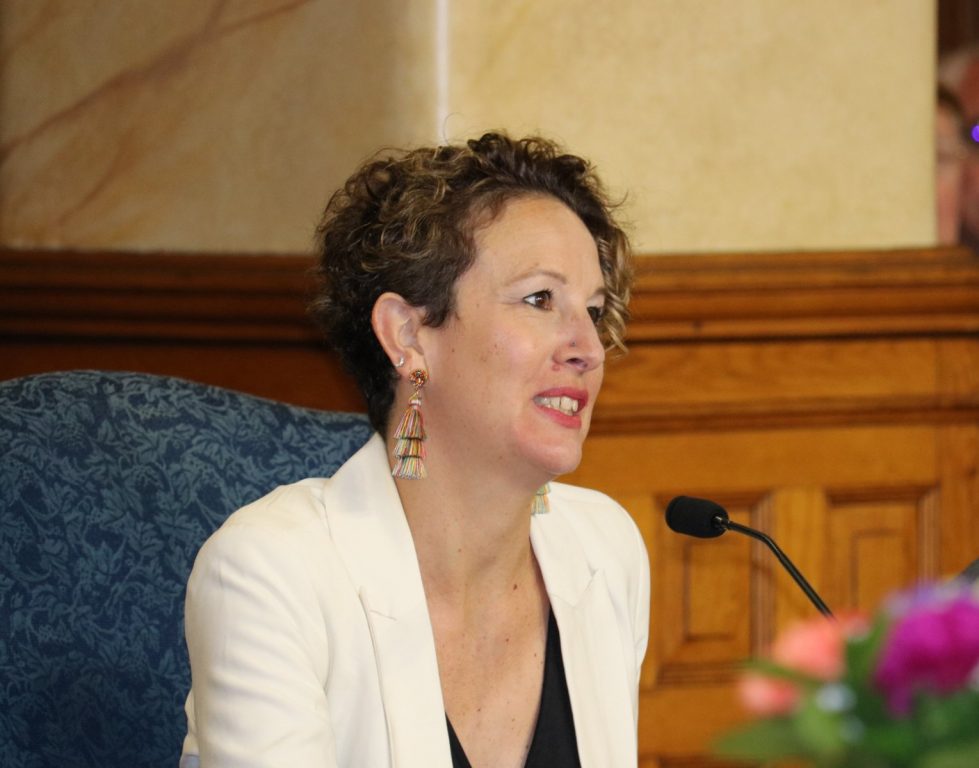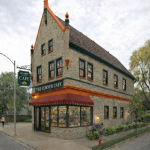Momentum Grows for Cash Payments To Low-Income Pregnant Women, New Mothers
Unconditional cash payment program initiated by Zilber would be expanded with city funding.
The Milwaukee Common Council is poised to put cash in the pocket of 100 new or expecting moms in a move aimed at improving health and wellness.
“We know that cash works,” said Zilber Family Foundation executive director Gina Stilp in presenting the program to the Finance & Personnel Committee on July 24.
Zilber already put $1.6 million of its own cash in. It’s now seeking additional partners to expand the pilot program and partner with it on sustaining the program.
Known as The Bridge Project, the program provides unconditional cash payments to 100 low-income mothers during pregnancy and the first two years of the child’s life. Zilber hopes to extend that to three years with additional partners.
“There is a great, huge need,” said Alderwoman Marina Dimitrijevic in an interview. “My goal with this is to get to the need and move in a positive way on infant mortality and child poverty. I think we have a unique opportunity where we have a foundation that’s brought forward a lot of private resources.”
The Milwaukee program is modeled on an effort backed by the Monarch Foundation in New York and is operated by the same nonprofit organization, The Bridge Project. Zilber, said Stilp, spent more than a year studying the effort before committing to bringing it to Milwaukee.
“Milwaukee really has very alarming outcomes for Black and Hispanic in terms of birth outcomes as well as high instances of infant mortality and poor health outcomes for infants,” said Stilp. According to figures in her presentation, Black mothers in Wisconsin have five times the mortality rate of white mothers and Black infants die at three times the rate of white infants. Hispanic infants die at 1.4 times the rate of white infants. One in seven children in Wisconsin live in poverty, but in the targeted central city neighborhoods where Zilber focuses in that climbs to 44%.
A University of Pennsylvania study of the New York program and a control group showed a 90% increase in mental health, a 242% increase in the number of participants having more than $500 in savings after six months and a 63% increase in participants receiving outside childcare.
“There is just less chaos and more stability in the home,” said Stilp of the positive impact being observed.
The Milwaukee version calls for a $1,125 one-time payment to prenatal mothers with $750 per month paid during the first 15 months and $375 per month in the final nine months. Qualifying mothers need to be in a household that makes $39,000 or less and lives in the 53204, 53205, 53206 or 53216 ZIP codes. Participants are offered services about maternal health and benefits counseling as well as partnering with peers for support.
“What we have found from the evidence is they’re used for basic needs,” said Stilp of the payments.
“That’s the most powerful part of it is that there’s no strings attached that there’s so much dignity and confidence that when women have the support, they’ll make the right decisions and they’ll support their family which will support our city,” said Dimitrijevic.
The city would provide $350,000, extending the pilot by nearly a full year.
There are already 73 participants in the program, including five that are unhoused. “We anticipate we will have the full 100 participants enrolled by the end of the summer,” said Stilp. She told the committee that more than 800 people already applied.
Dimitijrevic said it could save money in the long run because of reduced long-term reliance on social services. “It could save us in other areas,” she said. Stilp said research has shown a $13,000 return on investment for a child that sees support in the first three years, and that the cash transfers provide additional benefits to the household.
The city’s funding would come from reallocating a portion of its $394.2 million American Rescue Plan Act grant. The funding would come from reprogramming funding once set to go to the Social Development Commission for a housing program, but that remains unspent given the collapse of the organization.
“It was 390 million opportunities to try something new, make a difference on a lingering issue,” said the alderwoman of the funding source.
There are six co-sponsors currently listed in the city’s Legistar system, but Dimitrijevic told Urban Milwaukee she is optimistic she can get the final number to 10, a council supermajority. Current sponsors are Dimitrijevic, Jonathan Brostoff, Sharlen P. Moore, DiAndre Jackson, Council President José G. Pérez and Robert Bauman.
“I feel like it’s my role to push for women, children and families, because I do feel like that’s a group that really needs it,” said the alderwoman, the mother of two young children.
She previously led the adoption of a six-week paid parental leave following the birth, adoption or stillbirth of a child for both parents. “It’s quite a bold policy and I’ve heard from [the Department of Employee Relations] that it’s been an important recruitment tool,” said the alderwoman.
She also successfully led the city in directing $7 million from the America Rescue Plan Act grant to bolster the city’s early childhood educator sector by awarding stipends for workers, expanding an education program at Milwaukee Area Technical College and providing funds for training programs aimed at getting more men of color involved in the field.
Dimitrijevic publicly introduced The Bridge Project idea to her council colleagues in April and was seeking $450,000 to cover the cost of the full year.
The proposal is currently being held in the Finance & Personnel Committee and could be revisited as early as September. The city needs to reprogram any remaining and unlikely to be spent American Rescue Plan Act funding by the end of the year.
Legislation Link - Urban Milwaukee members see direct links to legislation mentioned in this article. Join today
If you think stories like this are important, become a member of Urban Milwaukee and help support real, independent journalism. Plus you get some cool added benefits.
Political Contributions Tracker
Displaying political contributions between people mentioned in this story. Learn more.
- October 23, 2024 - DiAndre Jackson received $75 from Sharlen P. Moore
City Hall
-
Council Blocked In Fight To Oversee Top City Officials
 Dec 16th, 2025 by Jeramey Jannene
Dec 16th, 2025 by Jeramey Jannene
-
Latest Effort to Adopt New Milwaukee Flag Going Nowhere
 Dec 3rd, 2025 by Jeramey Jannene
Dec 3rd, 2025 by Jeramey Jannene
-
After Deadly May Fire, Milwaukee Adds New Safety Requirements
 Dec 2nd, 2025 by Jeramey Jannene
Dec 2nd, 2025 by Jeramey Jannene






















